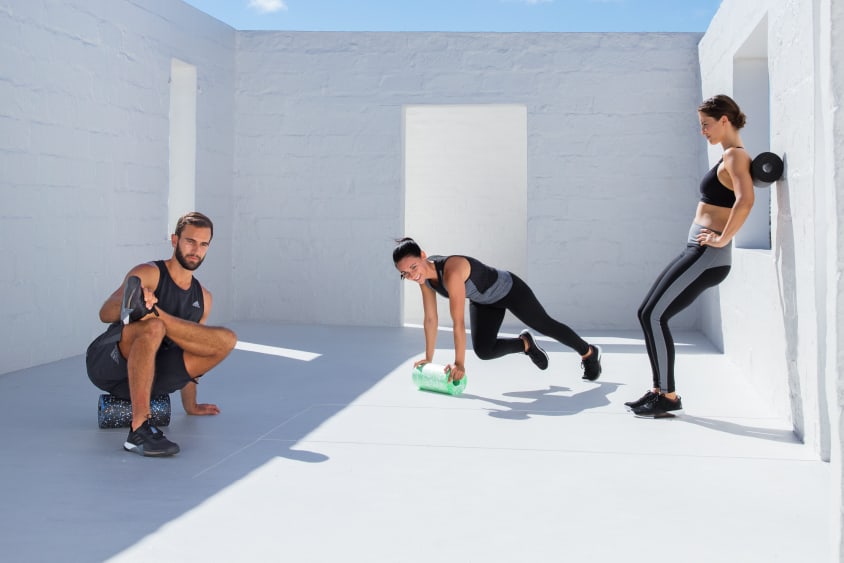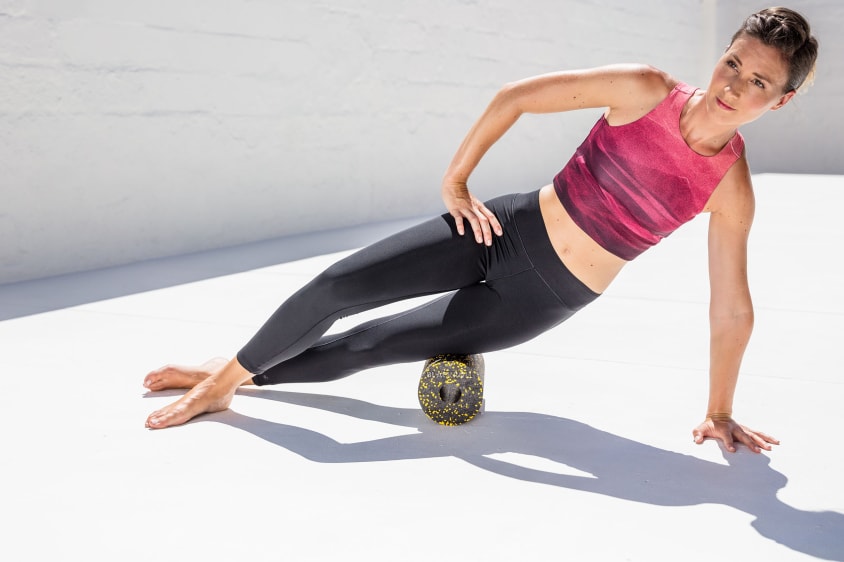
Fascia training: How often and how long you should use the fascia roller

Your body is a genuine miracle: in order that you can sit, stand, hop, or run, hundreds of muscles, tendons, bones and joints work together in perfect symbiosis on a daily basis. In order to retain and promote this mobility, it is worthwhile regularly training the fasciae. As a result, not only can adhesions in the connective tissue be eradicated, but fascial structures can also be made more robust and elastic, as a preventative measure.
But how often is it actually sensible to practise fascia training? And when and for how long should you roll your fasciae in order that they will remain supple? The answers to these questions regarding the optimal timing for your training with the foam roller can be found here.
01. Training parameters for foam rolling
For several decades it has been common knowledge that weight training should not be performed haphazardly, but rather must be performed with specific training parameters (for example, intensity, repetitions, and series) in order to achieve a desired goal. For instance, in order to build the muscles, 6-12 repetitions over 2-5 series must be completed, using around 70-85 percent of the maximum force. If the parameters are changed, for example using 90-100 percent of the maximum force, with 1-5 repetitions over 3-5 series, then muscle growth will be reduced, but with a much more significant increase in absolute strength. This means that, first and foremost, the goal to be achieved through weight training determines the training parameters.
Foam Rolling is similar to weight training in this regard, although the scientific basis does not date quite so far back. However, there are studies whereby training was realised with the foam roller with various training parameters.
The table below shoes the most important parameters, how they were used in the majority of studies, and how they achieved a positive effect, in particular with regard to improving mobility.
| Intensity | Intensity (Almost) maximum tolerable: 6-7 on a pain scale from 1-10 |
| Duration per body part | 1-3 minutes (depending on how you feel) |
| Series per training unit | 1-3 |
| Speed | 10-60 rolls per minute, per section of the body |
| How often per week | From three times to as often as daily |
02. How often is it reasonable to practise fascia training?
For effective fascia training, just a few short sessions on the roller per week are generally sufficient. Depending on whether you want to strengthen your fasciae with the training, or perhaps would like to loosen adhered connective tissue, we recommend that you roll your fasciae with varying frequency.
In order to achieve your respective goal, you should use the foam roller with the following frequencies:
- Tightening & strengthening connective tissue: Perform the fascia training approximately every other day, in order to strengthen the collagen and make the fasciae resistant to tearing. To this end, roll the tissue on the foam roller with movements that are as forceful
as possible. Tip: dynamic, jumping and bouncing movements have proven effective as a connective tissue-strengthening training method.
- Loosening & making connective tissue softer: If you want to break down old collagen and eradicate adhesions, it is best to use the foam roller daily. When so doing, we recommend that you practise fascia training with gentle and slow movements.
03. How often should you perform fascia training each week?
The most recent studies indicate that it is vital that you roll the fascia as regularly as possible, over an extended period of time, in order to achieve sustained effects.
It is therefore best to plan at least three fascia training sessions per week in order to benefit from the positive effects of the application. If your primary goal is to loosen adhered connective tissue, you will probably experience much clearer effects if you train the fasciae more frequently than this each week – here we recommend rolling the respective body parts on a daily basis.
04. What should the intensity be like when foam rolling?
Training on the foam roller should be unpleasant, but under no circumstances should it be excessively painful. As a guideline, you can imagine a pain scale ranging from 1-10, where 1 indicates “I feel nothing.” and 10 means “Help, my muscles are tearing!”. You should not exceed a value of 7 on this scale. If the pain is too great, your body will only emit unnecessary stress hormones. Your tissue will then become all the more matted. It is better if you reduce the intensity a little, and remain within the so-called “good pain” range.
You can vary the pressure in various ways:
- by varying the amount of body weight that you bear down on the roller.
- by varying the hardness of the roller.
- by varying the size of the contact surface (the smaller it is, the more intense)
05. For how long should you roll the fasciae?
In order to keep the fasciae supple, you only need to work on each body part for a few minutes. As a guideline, we recommend rolling for around three minutes in one region, before moving on to the next.
When training with the foam roller you should first and foremost allow yourself to be guided by how your body feels: as soon as you feel that the pressure at the body part that is undergoing treatment is easing significantly, you can continue rolling. Pay a little closer attention when treating particularly painful regions.
06. What is the correct rolling speed?
In order to have a positive effect on your body, you must not only perform fascia training on a regular cycle and for a sufficient period of time – you must also ensure that you use the correct speed when rolling.
In scientific studies, a speed of 1 cm per minute has proven optimal. However, because such a speed may not be feasible in practice, we recommend you set yourself a training goal of 10 to 60 rolls per minute, per body part. Fast rolling has more of a short-term mobilising and warming effect, whereas fewer rolls per minute are advisable for a regenerative effect and in case of tension.
- for regeneration and in case of tension: around 10 seconds rolling back and forth
- for activation: as quickly as possible, so that the motion remains fluid.
In practice it has also proven effective to sense your own tissue reaction, and linger on a painful spot until the pain noticeably eases. If you come across a painful spot while rolling, stay on it, and only continue rolling when just a third of the residual pain remains. This way, you have a natural, in-built speed bump, as it were.
07. When is the best time for fascia training?
The optimal time for fascia training depends on your personal objectives. This is because the foam roller can be used both to warm up the muscles prior to sport, and to promote recovery after a long day’s work or an intensive training session.
What is crucial is how you use the roller:
If you would like to relieve tension and adhesions that occur, for example, as a result of sitting all day or following sporting exertion, we recommend slowly rolling the fascia after the application of load.
If the self-massage is instead intended to promote short-term mobilisation, to aid warming up and enhance performance, you can also use the roller with fast movements prior to sport, in order to stimulate blood flow and improve body perception.
08. Conclusion: Fascia training – how often
Many roads lead to Rome. Unlike with weight training, it is possible to achieve the same goal with different parameters. The training parameters recommended here are based on up-to-date scientific findings, supplemented by our own personal experience. If you use these when training with the foam roller, you are sure to reap the benefits.


